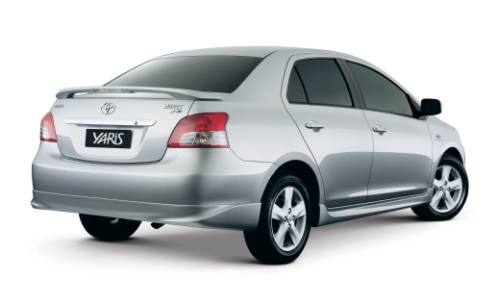The auto industry is beginning to look more and more like a crooked politician with lies and deceptive statistics. Everyone knows the industry is hurting recently: gas prices are up, vehicle miles are down, people are buying less, and people are buying smaller. All of this means that car companies are making a lot less money than they used to. Environmental concern is definitely a big player here, but when you consider that hybrid sales are also down a considerable amount this year, it’s obvious that the current ill state of the auto market is a result of a global economic downturn.
The industry is getting desperate
Why do I say this? My partner on the EcoModder forums sent me this link, telling me it would be worth writing about it. To be honest, I didn’t even read it for a few days, but now I’m glad that I did.
There’s no denying that people are becoming more and more concerned with the environment, but instead of selling hybrids, the industry is trying to twist that environmental concern into sales of big cars and trucks:
“Small cars don’t last,” DesRosiers says. “They fail to retain value, utility or desirability.” And while longevity may not be a sexy subject, it stands to reason that if some vehicles are useful longer than others, what consumers save in fuel efficiency will be lost in higher capital costs. In other words, small car buyers may be robbing Peter to pay Paul and manufacturers are just following suit.
Before the phrase “completely idiotic” starts to get thrown around, please keep in mind the Dennis DesRosiers is a professional industry consultant / smut peddler. It would be a stretch to call him stupid, but the things the he tries to have us believe, at best, push to limits of truth.
Firstly, take a look at my article on how fuel efficient cars are holding value better than less fuel efficient vehicles. If you don’t believe me, go to kbb.com and check anything out for yourself. Some of the larger cars may be worth more after a few years, but only after losing more value, on average, than smaller, more fuel efficient cars.
DesRosiers goes on to assert that small cars are less durable:
But according to DesRosiers and other analysts, small cars are less durable. First off, they are built lighter. Secondly, they are cheaper, so they attract younger drivers who tend to maintain them poorly. They have a lower resale value, which guarantees they won’t trade hands many times before they are scrapped, and they’re more likely to be written off by insurance companies if they are involved in serious collisions. In other words, “the useful life of the vehicle” is as short as their wheel base, according to Erich Merkle, an automotive consultant with Crowe Chizek in Grand Rapids, Mich.
To me, it makes sense that small cars are lighter. They’re smaller, therefore they consume less materials, and weigh less. And get this, they’re smaller, therefore they consume less materials, therefore they are more environmentally friendly! DesRosiers expects to argue that big cars go to the junkyards less frequently, but he “conveniently forgets” that when they do, they also send more materials to the junkyards with them. This article also seems to imply that cars end up in some sort of landfill, rather than stripped and melted down for scrap and reused in new vehicles.
If you look at this reliability index, you will see that contrary to the assertions of this article, cars like the Honda Civic and Toyota Yaris are both in the top 6 of all cars in terms of reliability. The article in question specifically attacks these two small cars for being the type that would end up in junkyards due to their “lack of durability,” but that doesn’t seem to mesh with what most consumers and analysts are saying about the same cars.
Secondly, DesRosiers seems to conflate young drivers destroying their cars with the cars not being durable. Does he seem to think that young drivers who don’t maintain their cars wouldn’t be sending SUVs to the junkyard in just the same way they do small cars? He expects us to be too stupid or uncritical to think about these deceptions, but I hope that most of us here on EcoModder can see through it.
Now, onto his assertion that small cars just aren’t worth as much:
Comparing the entry-level Chevrolet Aveo (1,148 kg), for example, to the mid-size Chevrolet Malibu (1,642 kg), Merkle adds, “You will get rid of the Aveo faster. It’s much lighter, it doesn’t have the strength. After about three years, the Malibu will be worth something; the Aveo, no.”
I did a little research on KBB, and comparing 2008 models with 2005 models with 45,000 models, yes, the Malibu will be “worth something.” He’s telling the truth! The 2005 Malibu LS 4D is still worth a whopping $11,815, whereas the same model of Aveo is only worth $9,115.
But wait, there’s more. The 2008 only costs consumers $12,188 for that model while Malibu owners are paying $19,522. That means the Malibu has lost 40% of its value in just three years, but the Aveo has only lost 25% of its value. I guess the Malibu wins the race to the bottom, not the Aveo, contrary to DesRosiers’ suggestion about their comparative values.
So, in conclusion. When someone who’s paid to tell you what kind of car to buy is doing just that, use a critical eye to look for deception, because you may just find some. I hope you all take the same approach to what I write as well. I may not be right, but I’m also not in the market to sell my Civic, either!
If you liked this post, sign up for out RSS Feed for automatic updates.
Popularity: 2% [?]





{ 3 comments }
That’s comedy… I can’t believe they’d stoop to that level of lying.
My Civic sold for $14000 in 1997, and is still worth $4200 according to KBB.com; a Land Rover Discovery, a much larger, heavier, and supposedly more rugged vehicle, which sold for $45,000 in 1997 is now only worth $2400, and that’s for excellent condition and still running… very rare, unlike those flimsy ’97 Civics. Oh, and I only average 45 MPG, just a tad higher than the Rovers 13 MPG.
While he does make some ridiculous claims, I don’t think it’s as bad as your review implies. First, he recommends buying a mid-size car a couple of years old and keeping it. Of course, the case could be made that creating market demand for two year old mid-size cars enables the current owners of such cars to trade up more easily but I think, on balance, that the “buy used” mentality does not especially help automobile manufacturers.
Second, it is certainly true that one would have to save an awful lot of fuel to offset the embedded energy (and carbon footprint) of any new vehicle purchase. For example, I calculate that I can save $1100/year in gas (at $2.50/gallon) by trading in my 2006 LR3 HSE for a Ford Focus (a relatively small car that can be upgraded to have the features I want). Further, I could make a profit by selling the Land Rover and buying the Focus. But the net embedded energy in the new car would offset much, if not all, of the fuel savings. If I buy a late model Focus, I’m likely enabling the seller to buy something new.
In the end, for most people I suspect the greenest thing to do is to keep and maintain whatever they have, drive it as little as possible, and drive when necessary using the techniques so thoroughly detailed elsewhere in this site.
Finally, the second page of the article is unavailable, a least to me.
Comments on this entry are closed.
{ 1 trackback }